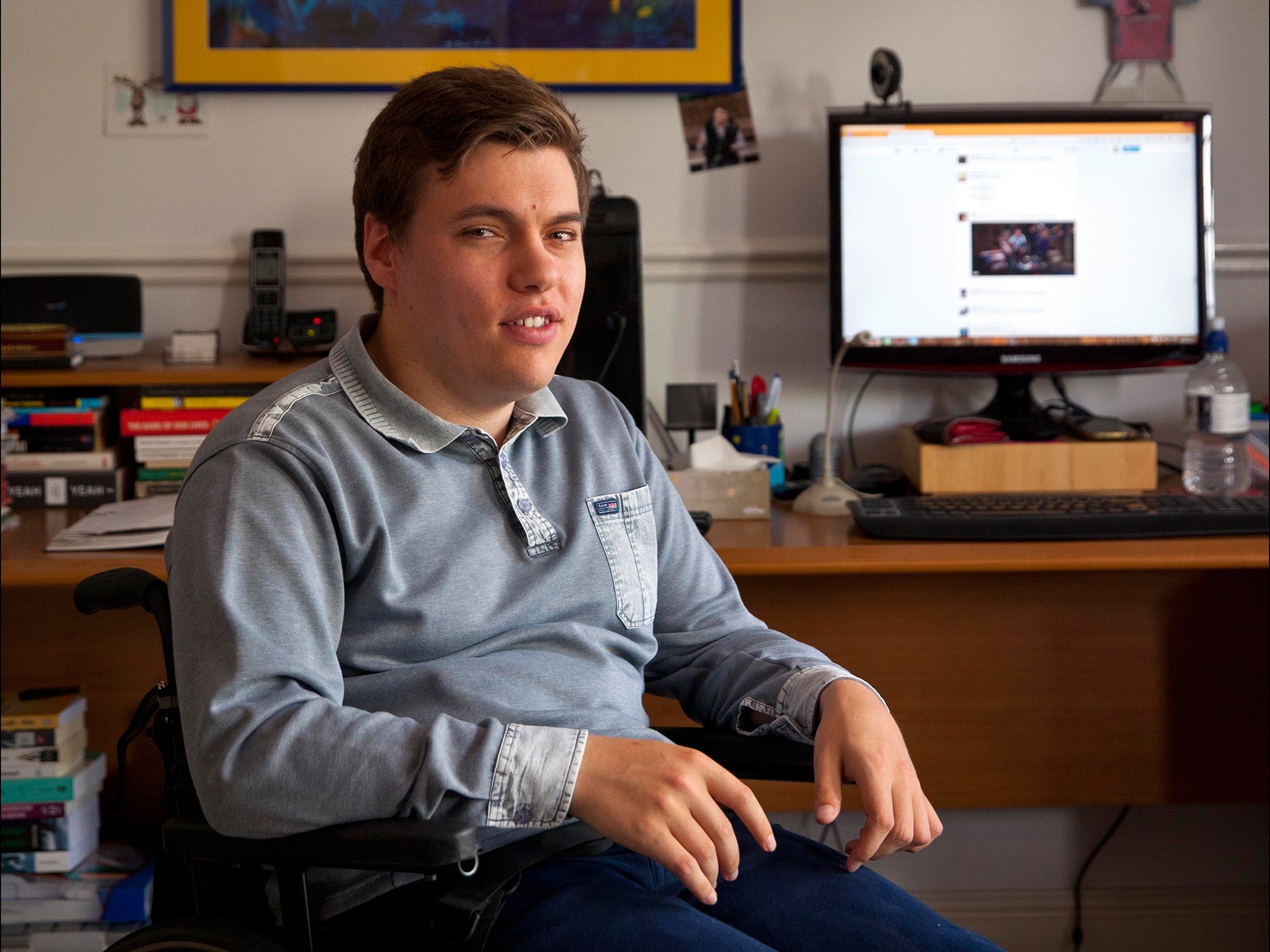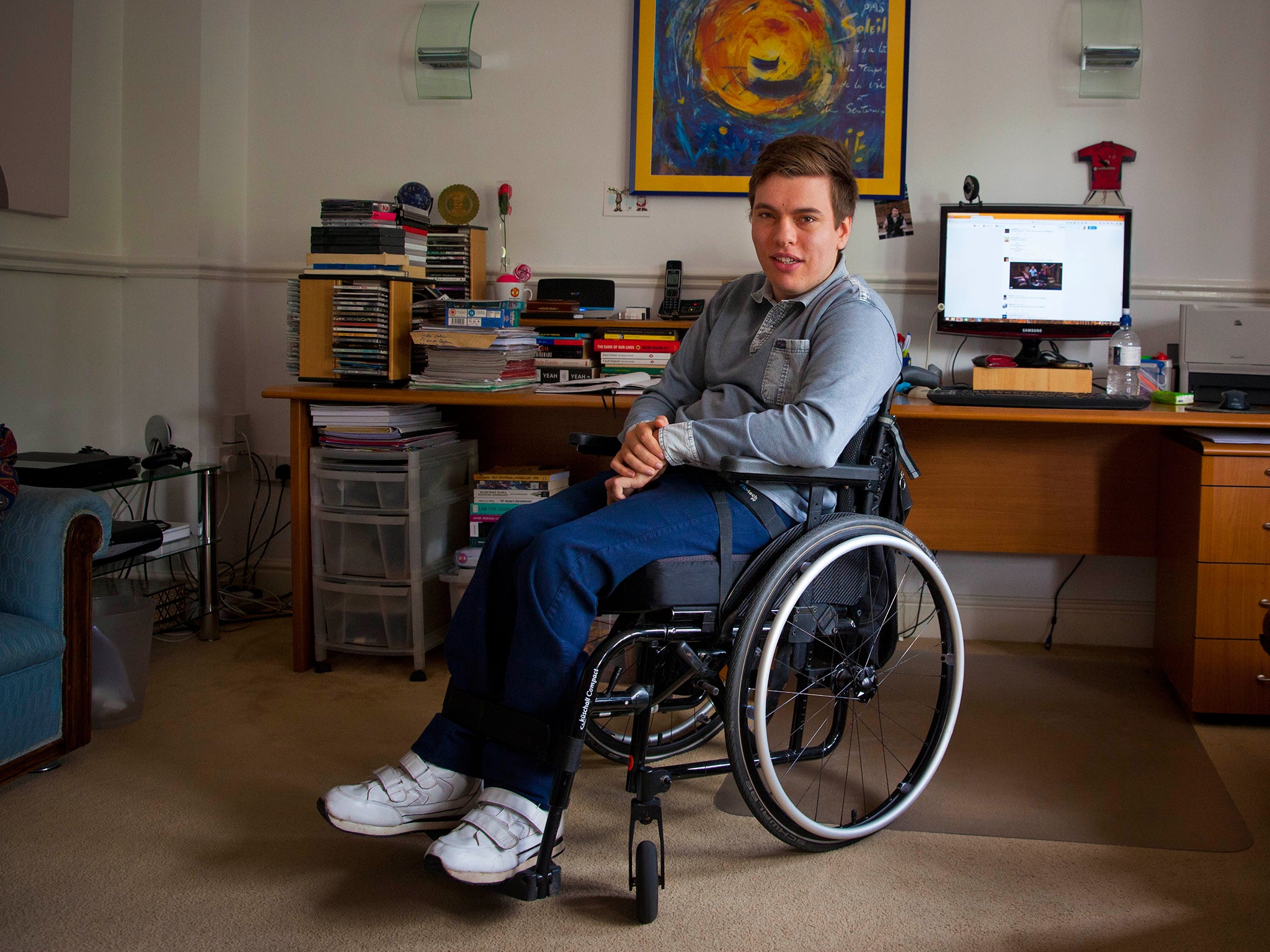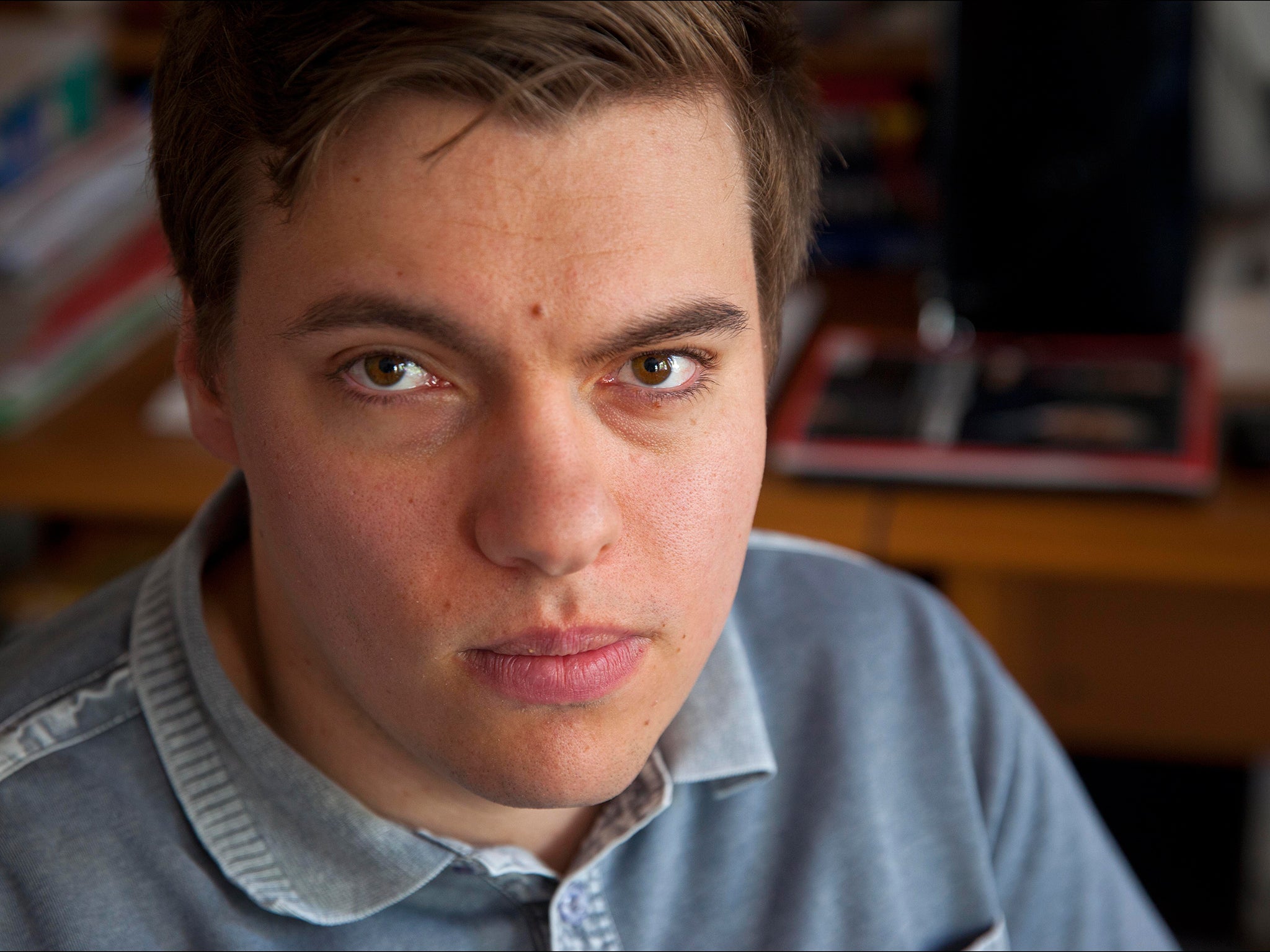Sitting target: How welfare cuts prevent disabled young people from making their own way
'The fact that I have cerebral palsy has never truly scared me before now'

Your support helps us to tell the story
From reproductive rights to climate change to Big Tech, The Independent is on the ground when the story is developing. Whether it's investigating the financials of Elon Musk's pro-Trump PAC or producing our latest documentary, 'The A Word', which shines a light on the American women fighting for reproductive rights, we know how important it is to parse out the facts from the messaging.
At such a critical moment in US history, we need reporters on the ground. Your donation allows us to keep sending journalists to speak to both sides of the story.
The Independent is trusted by Americans across the entire political spectrum. And unlike many other quality news outlets, we choose not to lock Americans out of our reporting and analysis with paywalls. We believe quality journalism should be available to everyone, paid for by those who can afford it.
Your support makes all the difference.I frequently think of my life as a never-ending race, in which I am up against the man I should be for the prize of the life I desire. I hold the sharper mind, but carry a permanent injury, so I mostly remain two steps behind. Occasionally I may draw level, thanks to a combination of bloody-mindedness and support from others, without which I would undoubtedly fall even further behind. Alone, it would be no contest.
Yet the fact that I have cerebral palsy has never truly scared me before now. Sure, there have been many battles of angst-ridden internal frustration, but these have always been personal. At no point previously have these battles, due to my disability, endangered my life choices or sense of identity. I have my parents’ support, both financial and otherwise, to thank for this. It has allowed me to dream big and achieve beyond what others narrowly imagined.
As I look to move out of home permanently, aged 25, with journalism finally beginning to pay its way, the reality of fully relying upon Britain’s 2015 model of social welfare is nauseating. This Government has pledged to cut £12bn from the welfare budget, and leaked Whitehall documents suggest that a portion of these cuts will fall upon disability benefits.
Like many other disabled people, I live in a twilight zone, with a mind and personality at sharp odds with the restrictions of my body. Most people do not know how my disability affects my daily life. I do all I can to hide it. But, bluntly, I need help just to live. I cannot dress or transfer to the toilet without help. I cannot cook. This is just the surface.

Now, at a time when I should be taking risks to make the most of life, thanks to Government cuts, I face the prospect of becoming what Stephen Hawking so perfectly described as a “burden”. This is something every person needing assistance dreads, whether they are elderly, disabled, depressed or in the grip of addiction. I presently rely on year-long live-in care placements from Volunteering Matters, a charity providing volunteering opportunities for foreign and domestic students who average between 18 and 22 years-old.
This arrangement suited me perfectly during days of drunken student hedonism and essay-filled all-nighters but, eight years on, I crave long-term stability. I would like to have someone within my age range who understands where I am in life to help empower me. But instead, I will either need to rely on a series of agency carers, costing hundreds of pounds, or council care.
The concept of the professional council care worker is now a myth. Many councils, including my own, outsource care responsibilities to private companies who draw from a limited pool of employees with no standardised training. This leads to a make-do rather than best practice attitude, with hours squeezed due to financial constraints.
To give you an example: as a young man, I asked the council for a male carer to provide two hours’ additional assistance in the morning to allow my mother some respite. You see, our live-in volunteer is only allowed to work 35 hours a week. Crucially, this includes hours “on call” as much as hands-on work, and falls far short of the actual hours in a week. This leaves mum and dad, aged 63 and 68 respectively, to fill in the gaps. Both have been denied carers’ allowance because they are in receipt of the old age pension. Admittedly, we do not live close to the breadline, as they were both successful in their lines of work, but they are literally being made to pay for having a disabled son.
After waiting for four months, during which no male carers were found, I reluctantly agreed to a female carer in a bid to speed up the process and save the strain of my mother’s (understandable) tiredness and the strain on the family. A lady was found within days. I began to prepare myself, to think of the bigger picture. And then, fortuitously yet ominously, the lady failed to turn up. Eventually a man was found.
I had plenty of female “carer” relationships throughout my childhood, including every classroom assistant, every nanny. It is a different story now – let alone the fact that a female carer would cause difficulties with future girlfriends, for instance. Imagine how silently awkward it would be, how delicately confusing and painful for all involved. I am a full-grown man and deserve to be treated as such.
I am not alone in this desire. There is no more vivid depiction of the strain disabled people are facing than when, earlier this month, 30 disabled protesters, some in wheelchairs, tried to storm Prime Minister’s Questions. They were fighting to save the Independent Living Fund (ILF), a longstanding £320m initiative central to helping disabled people manage care costs and live independently, which was recently signalled for closure and finally terminated last week. Its loss will affect 18,000 disabled people, the most disabled being the most affected.
The Department for Work and Pensions (DWP) continues to frame the closure of the ILF not as a cut, but rather a “transition” of responsibility to local authorities under the new Care Act. A spokesman for the Government told me that “more than £260m will be made available to former ILF users” in the forthcoming year, with local authorities and devolved administrations “fully funded to ensure disabled people get the targeted support they need to live independent lives”.
What the DWP fails to mention, aside from the £60m decrease, is that the money given will not be ring fenced. Considering the £1.1bn cut in social care budget that the local authorities will face this year, there is every chance that the Care Act money will be allocated elsewhere and severely disabled people will be cut off.
One week before the ILF’s closure, pressure group Disabled People Against Cuts (DPAC) used freedom of information requests to find that, of the 147 local authorities that responded, 88 were still unaware of how much funding they would receive. Worse still, 12 were unable to say whether any of these funds would be spent replacing the ILF support. Thirty have not, as yet, even set a timetable for the completion of replacement support assessments required under the Care Act.
All this means that, when I do move out, it is highly unlikely the council will agree to the “on call” care I need. As a freelance journalist with variable working hours and a busy social life, my life demands flexibility. Breaking news and showbiz parties do not stick to rigid care timetables or recognise my disability (a wonderful truth that I revel in). And so, in the search for independence and attempts to fulfil ambition, both professional and personal, my parents and I must either try and fund private care at great expense, thereby limiting their precious retirement time alone together, or I must rely on friends and loved ones for support.
And this is where my fear of being a “burden” becomes very real. I tell no one at work that the reason I do not join them in the canteen on the night shift is because that is when I meet my mother to help me to the toilet. Her two-hour round trip in and out of London, sometimes late at night, cannot go on.

It sickens me that it has come to this. I sometimes feel idiotic about my choice of profession. Zero hour contracts are rife, permanent roles sparse. Then I remember disabled people and those needing social care have already been hit up to 19 times harder by cuts than others. I would need a very well-paid profession indeed, to be able to live the life I’d like.
At this point I must ask myself: how much am I prepared to lose of myself to fit the system? I have spent my life bucking it, but now I need to rely on it. However, I neither fit the convention of Cameron’s “desperately disabled”, fulfil the role of inspiration porn (as explained so wonderfully by the late disability advocate Stella Young), nor am I a work-shy benefit scrounger. I am part of the vast lost middle, too unique for Government statistics and cuts to compute.
A friend with whom I studied journalism in London understood this nuance and we joked about it often. “You’re such an inspiration,” she would say, with quiet sarcasm. Although it often went unsaid, I sometimes felt that the fact that she is gay allowed her to appreciate my silent struggle not to be anything strikingly different, but simply myself. That is a human right, and one I will fight for.
The prospect of relying on friends, girlfriends or other loved ones at some point in the future makes me feel guilt, but the responsibility for this does not really rest with me and stretches far beyond party politics. It represents the loss of morality in favour of big business and cold market forces, a sad fact that might be reversed by giving human faces to those affected.
So while I may not have the answers, I am sharing my reality here in the hope that it makes someone, with the power to help, stop and think of the lives behind the numbers.
A version of this article appeared on Somesuch.co
Join our commenting forum
Join thought-provoking conversations, follow other Independent readers and see their replies
Comments